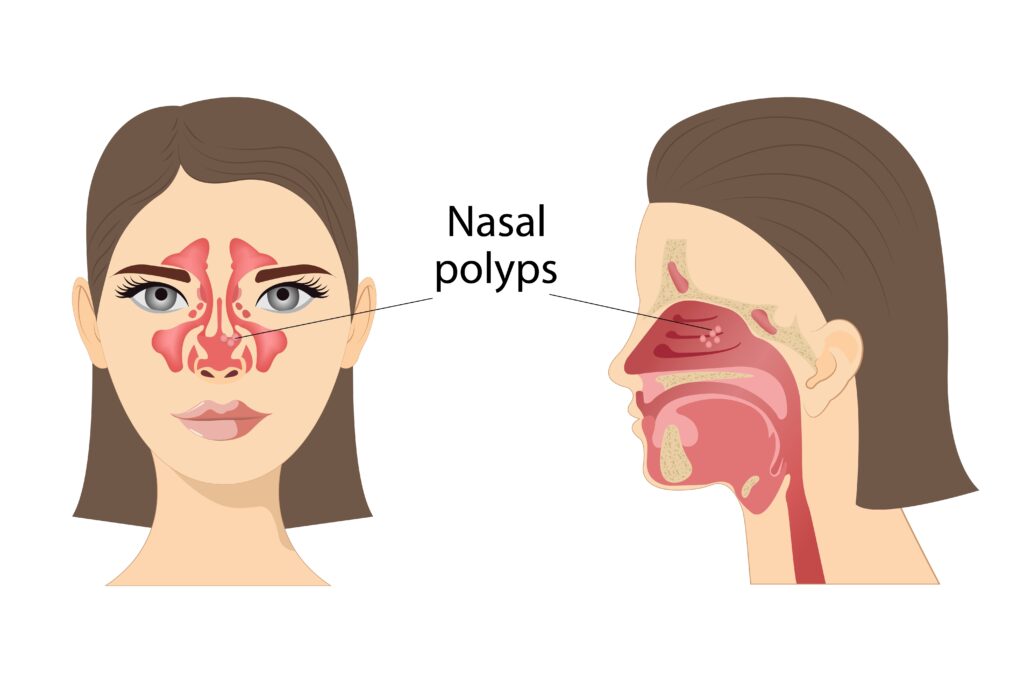Posted by: Maryland ENT in General
Have you been congested for 12 weeks or more? Is your sleep often disrupted by persistent congestion or a stubborn cough?
You may have nasal polyps. Nasal polyps are benign growths that can negatively impact your health and interfere with your quality of life.
Keep reading to learn about the 7 signs you may have nasal polyps and how they can affect your ability to breathe well.
What are Nasal Polyps?

Nasal polyps are soft, tear-shaped, painless growths inside your sinuses or nose. As polyps grow larger, they may look more like grapes.
These noncancerous growths typically appear on both sides of the nose. They can become irritated or swollen, making it difficult to breathe through your nose.
You’re more likely to develop nasal polyps if you have chronic nasal inflammation, recurring infections, allergies, and asthma.
What are the Signs of Nasal Polyps?
People with small nasal polyps may not know they have them. That’s because small polyps usually don’t cause symptoms.
But if they begin developing, you can develop symptoms like:
1. Stuffy Nose
If you’re experiencing chronic nasal congestion, nasal polyps might be the culprit. Larger or multiple nasal polyps can obstruct your nasal passages, causing congestion.
As a result, you may find it hard to breathe through your nose, forcing you to breathe through the mouth and causing further discomfort.
2. Post-Nasal Drip
Post-nasal drip refers to the mucus that runs down the back of your throat from your sinuses or nose. You usually swallow mucus without noticing.
However, you’re typically unaware of this because the mucus is thin and mixes with saliva, dripping down the back of your throat undetected. But it becomes more apparent when your body produces thicker or more mucus than usual.
Post-nasal drip is a classic sign of nasal polyps. It can irritate your throat, causing a persistent cough, sore throat, and a hoarse voice.
Post-nasal drip tends to worsen at night when lying down, as mucus can easily collect and drip into the back of the throat in that position. It can disrupt your sleep and cause insomnia.
3. Snoring

If your partner, roommate, or family members have told you that you snore loudly, polyps could be the cause. During sleep, your throat, tongue, and soft palate muscles relax, partially blocking your airway.
Snoring is the snorting, rumbling, or whistling sound that occurs when air flows through a narrowed airway past relaxed tissues, making the tissues vibrate as you breathe. Sometimes, nasal polyps can contribute considerably to the obstruction in your airway.
They may block your nasal passages, changing how air flows. The turbulent airflow can make tissues in the nose and throat vibrate even more, resulting in louder, chronic snoring.
4. Decreased Sense of Smell or Taste
Your sense of smell enriches your life. But you might not give it much thought until it becomes compromised.
If your sense of smell is no longer as strong as it used to be, or you’ve noticed that your taste buds aren’t working as well as they once did, it could be due to polyps. Nasal polyps can obstruct your nasal passageways and block airflow, preventing small particles from reaching the olfactory nerve.
This can lead to a reduced sense of smell, which may also impact your sense of taste, as these two are closely related. The olfactory nerve enables your sense of smell and is found high up inside your nose.
With polyps, you may experience a decreased sense of smell or taste for an extended period.
5. Nasal Discharge
A runny nose is often a sign of a common cold, the flu, or allergies. But if it lingers for a long time, it could mean you have polyps.
An increase in nasal discharge that becomes thicker and turns from clear to green or yellow is often a sign of nasal polyps.
6. Trouble Breathing
Various reasons, such as a cold, the flu, and anxiety, can cause breathing problems. However, all these issues are temporary.
Large polyps are likely the reason if you can’t pinpoint the cause of why you’re struggling to breathe. As polyps grow, they block airflow, making it difficult to breathe. Not being able to breathe easily can be frightening.
When this happens, it’s time to visit your ENT specialist at Maryland ENT.
7. Chronic Sinusitis
Sinusitis, or a sinus infection, is the inflammation of the sinuses. The sinuses are the air-filled spaces behind the forehead, eyes, cheeks, and nasal bones.

Your sinuses constantly produce mucus that drains out through your nose and the back of your throat. This drainage ensures your nose remains free of allergens, bacteria, and other germs.
Usually, viral infections, allergies, or bacterial infections can irritate your sinuses, causing inflammation and swelling. The swelling traps mucus, which leads to mucus buildup.
As mucus accumulates in your sinuses, it can provide an ideal environment for germs to thrive. These germs can cause an infection, leading to inflammation, pain, and sinus pressure.
You may have chronic sinusitis if your sinus infection lasts longer than 12 weeks. One of the causes of a chronic sinus infection is nasal polyps.
Large polyps or clusters of polyps can lead to chronic sinusitis and persistent symptoms such as congestion, a runny nose, and bad breath.
Get to the Bottom of Your Symptoms
Nasal polyps can wreak havoc on your health, leaving you feeling uncomfortable and looking for answers. Luckily, you don’t have to live with nasal polyps.
The experienced team at Maryland ENT can determine what’s causing your symptoms and offer the most effective treatment so you can find long-lasting relief. Do you suspect you have nasal polyps?
Today, schedule your appointment at Maryland ENT in Lutherville and Baltimore, MD. You deserve to find a long-term solution to your discomfort and pain.



